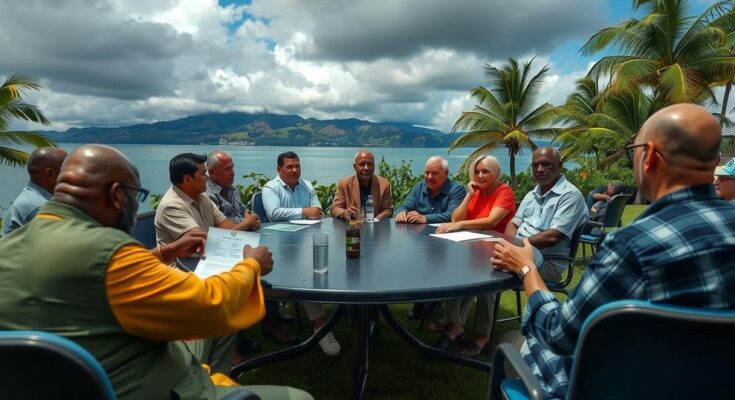The Commonwealth Heads of Government Meeting in Samoa addressed climate change and slavery reparations. Leaders, led by King Charles, discussed the impact of global warming on small island nations and the call for Britain to consider reparations for transatlantic slavery. With ongoing debates and diverging opinions, the summit highlighted the urgency of these issues and the need for dialogue among member states.
On Thursday, leaders from the Commonwealth nations convened in Samoa for a summit focusing on pressing issues such as climate change and the contentious topic of reparations for transatlantic slavery. The event, part of the Commonwealth Heads of Government Meeting (CHOGM), was attended by representatives from 56 countries, many of which have historical ties to the British Empire, including King Charles, who leads the Commonwealth. Climate change, a predominant concern for numerous member states, particularly for low-lying island nations, was prominently featured during the discussions. Tuvalu’s Climate Change Minister, Maina Vakafua Talia, emphasized the imperative for wealthier nations to adhere to the Paris Accord’s target of limiting global warming to 1.5 degrees Celsius, warning that new fossil fuel initiatives could spell disaster for his country. Australian Foreign Minister Penny Wong underscored the severity of climate change as a critical national security issue and an economic threat for Pacific nations. As part of the summit’s agenda, there was also a focus on the question of reparations related to historical slavery. Britain’s Prime Minister Keir Starmer reiterated that the British government would not address reparations at this summoning, indicating a desire to focus on future discussions rather than historical grievances. However, representatives from the Caribbean Community (CARICOM) and African Union maintained that this summit offered a significant opportunity to engage in dialogue regarding reparations. Eric Phillips from CARICOM noted the importance of the Commonwealth in addressing these historical issues. Although there were indications of reparations discussions occurring informally, they remained a contentious topic, with varying perspectives on accountability for historical injustices. Throughout the summit, the impacts of climate change and the legacy of slavery highlighted the complexities of the Commonwealth’s past and the urgent need for actionable solutions moving forward.
The Commonwealth is a political association of 56 member states, most of which are former territories of the British Empire. This summit in Samoa serves as a platform for leaders to tackle significant issues such as climate change, with many nations feeling the acute impacts of rising sea levels and extreme weather events. Additionally, the legacy of slavery and colonialism remains a deeply entrenched issue, with calls for reparations gaining prominence in international discourse. Climate change poses a significant risk to small island nations, especially those in the Pacific, while the history of transatlantic slavery has led to lasting socioeconomic disparities that continue to affect descendants of enslaved peoples. The intersection of these issues presents both a challenge and an opportunity for Commonwealth countries to come together to address past grievances while attending to present-day crises. In this context, leaders are called to engage in constructive discussions that acknowledge historical wrongs and work toward collaborative efforts in combating climate change.
The Commonwealth summit in Samoa has underscored the intertwined nature of contemporary global challenges such as climate change and historical injustices related to slavery. There is a growing consensus among Commonwealth nations regarding the need to address rising sea levels and their implications for vulnerable island states while recognizing the demand for reparations and meaningful dialogue surrounding past injustices. Although differing views exist regarding reparations, the summit presents a vital platform for fostering discussions that can lead to significant actions for the future, allowing nations to navigate the complexities of their shared histories and contemporary realities.
Original Source: stratnewsglobal.com




